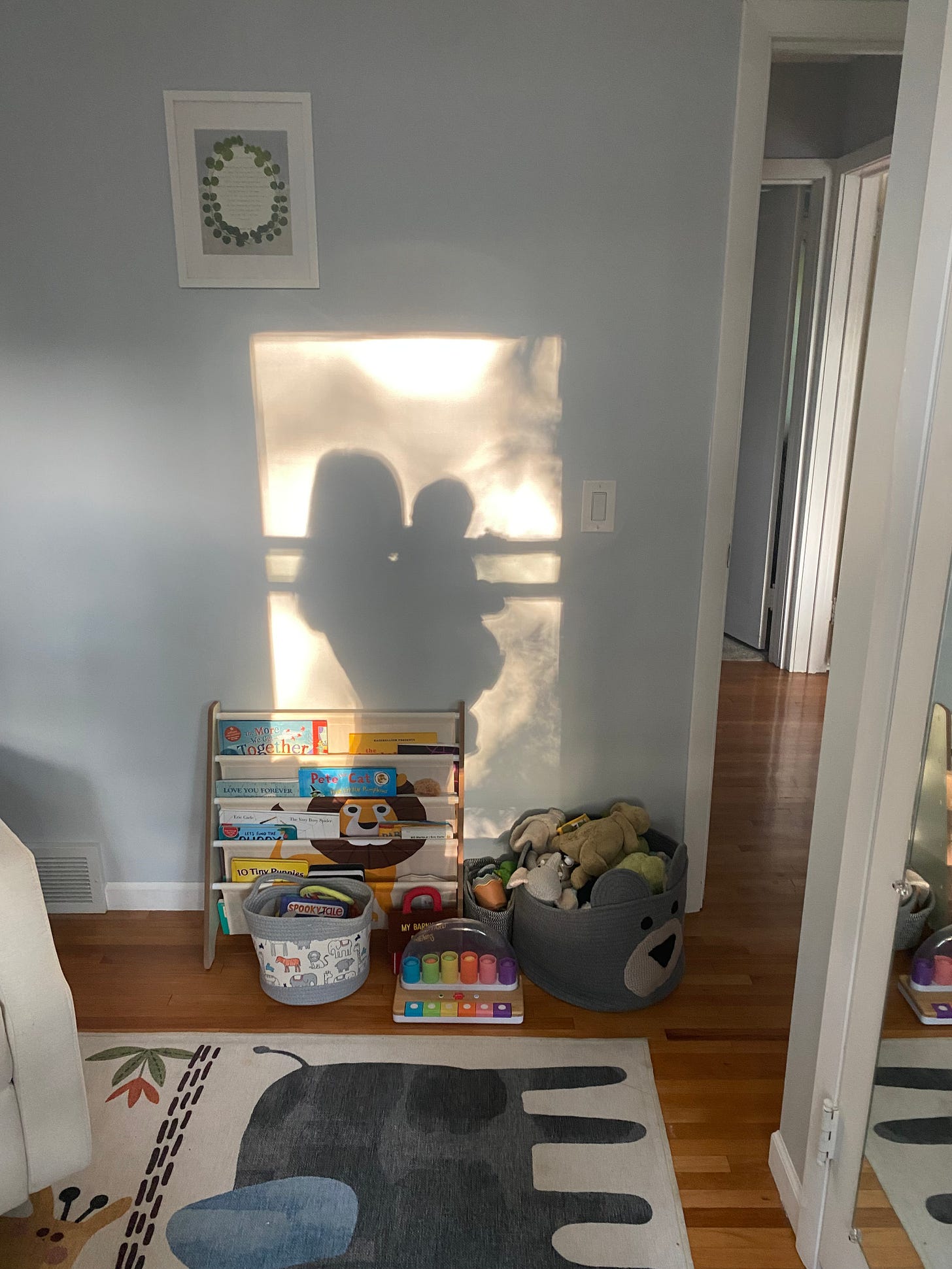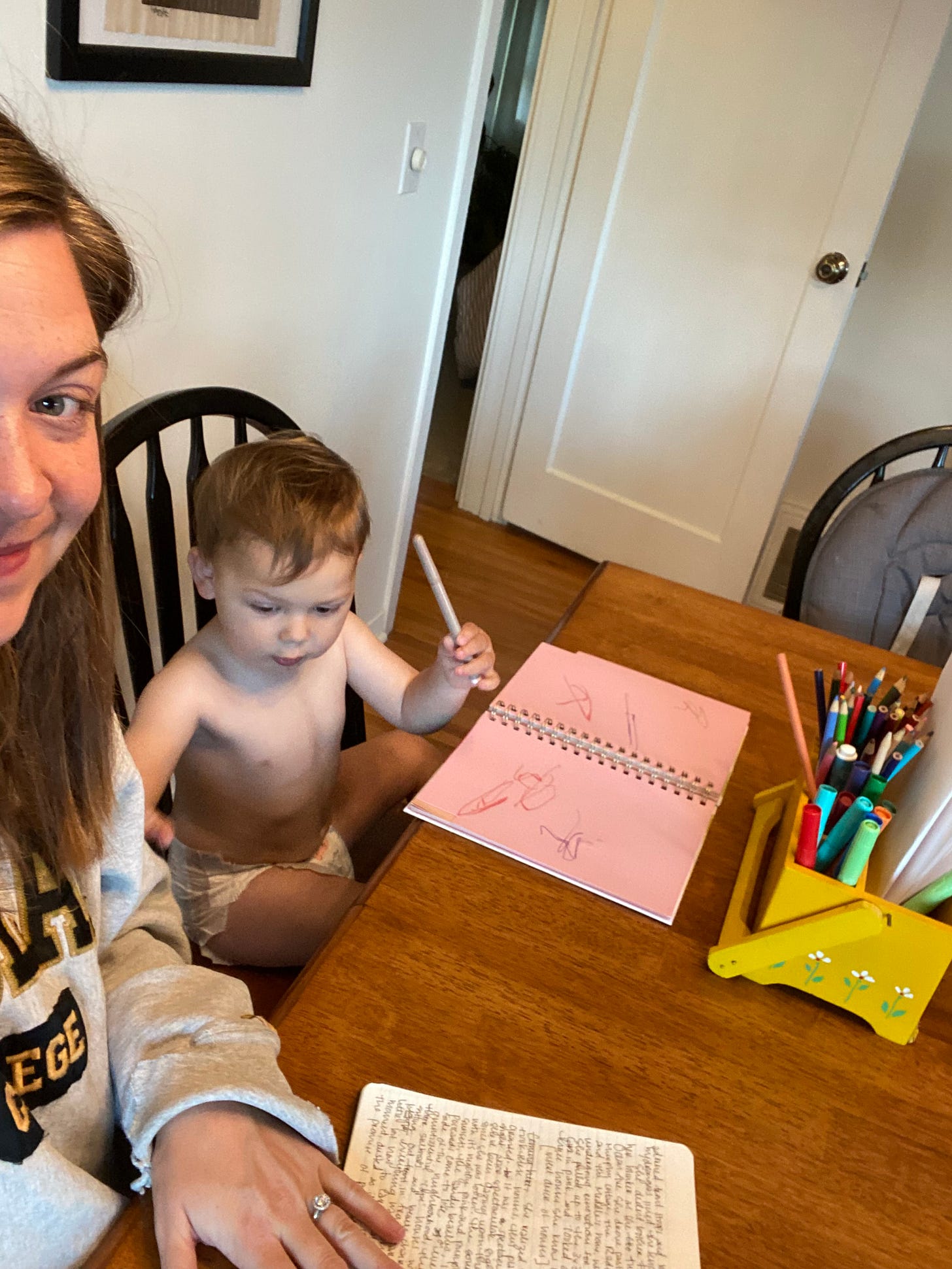I was talking on the phone to a good friend of mine the other day. She remarked that she’s been unable to write because life has intervened in insurmountable ways. She was worried that once life calmed down again, she wouldn’t be able to get back into the groove of writing. This is a sentiment that I heard again and again from women in my Mother Writer class this winter. So many of them had had to take a break, sometimes years-long, from writing in order to tend to their children, to work, to keep their homes functioning. I remember one woman wondering aloud if she could even call herself a writer anymore.
I know there are a lot of beliefs and adages out there that say, “You’re a writer if you write,” which seems to imply that the inverse is also true: You are not a writer if you’re not writing.
But that’s too simple. And if there’s one thing I’ve learned since becoming a mother, it is that nothing is ever so simple, so black and white.
~
My son was born in a vacuum-assisted birth that resulted in a third-degree tear. I could not walk to the end of my city block without being in extreme pain for over six weeks. I bled for over eight. I watched friends and relatives have babies and seem to “bounce back” to their usual activities within a few months—dance classes, running, hiking up mountains. All I wanted to do was go on walks with my family around the neighborhood, but, even many months after giving birth, if I walked a mile, I’d pay for it later, doubled over in bed, wondering how my body could be so strong while bringing a person into the world and so weak in the wake of it.
In the midst of my bodily frustrations, I felt intensely creative. I had so many emotions and experiences I wanted to get on to the page, but there simply wasn’t space. I needed to focus on my baby and in trying to heal my body. I had no room for anything else. This devastated me at first. I didn’t know who I would be if I wasn’t actively writing, but I just couldn’t do it. I couldn’t hold it all. The guilt at not writing, the forcing myself to work through the shitty first drafts, the meandering and loose plots and character arcs I was holding in my head—it all felt too amorphous while I had a young child and visceral pain tethering me to the present moment.
I couldn’t dedicate brain space or time to that when I had so much else to do: keep my baby healthy and happy, keep myself fed and clean(ish), rest. I had to go into survival mode. I made the decision to let my writing go. Quietly, I stopped posted on Substack. I stopped opening the notebook where I had been writing my novel. I stopped forcing myself to try to squeeze my ideas into poems when I knew they needed the space of essays. I just stopped. I let it go. I was surprised to find that instead of horrible, I felt a rush of relief.
~
I learned so many things in graduate school, and most of the longest lasting ones had less to do with craft and more to do with maintaining the writing life. One of these lessons came in the form of a conversation with my thesis advisor, the late and dearly missed R.H.W. Dillard, or Richard, to those of us lucky enough to know him off the page as well as on it. He said once that he got so many good ideas in the shower; he thought it was because of the physical feeling of the water on his head, drumming up something inside. He talked about the writing he would do in his head while taking his beloved dog on a walk. Another teacher I had, Liz Poliner, told us a story about acclaimed novelist Edward P. Jones. Apparently, he would plan out and write his entire novels in his head, imagining every last detail before he sat down to write them. Stories like these reminded me that writing is so much more than sitting in a chair and typing on a computer. As Richard told me, most of our brain matter is a mystery. Who knows what’s going on in there? The subconscious is powerful. If we let ideas knock about in our heads, sometimes, they’ll coalesce into something we can turn into art.
Being a writer is more than stringing words together. Being a writer—being an artist—is the way we move through the world. Even if I wasn’t hitting a word count every day, I was still a writer. I could tend to the faculties that made me one. I could relish in my son and zero in on his presence with a full-hearted gratitude and joy. Experiencing this type of love could only make me a better writer. I could focus my attention on the ants he followed with his eyes and fingers on our patio. Cultivating this kind of unbroken attention would help me build stamina to focus and I’d see the world in new ways through his eyes. Furthermore, exercising a way of seeing others and the world around me through the lens of mother is a radical act—one that is so needed in our world. As Catherine Ricketts writes in her book The Mother Artist:
“I imagine a city built through this gaze: buildings designed, medicine practiced, public policy written, law enforced with eyes that are awed by the stranger. If we really saw each other, would our communities be marked by tenderness and not rurality?”
So I was writing even when I wasn’t writing. And, so much more importantly, I was moving through the world slowly, and with a deep love and vision aimed at my son and at myself, and radiating ever outward, toward the people and plants around me and beyond my sight. I was an artist and the art was me and everything I touched.
~
When I was talking to my friend on the phone, she asked me for how long I stopped writing after my son was born. I thought for a moment. “Probably about a year and a half,” I said. And then once I started writing, which was only fairly recently, it was as though everything I’d stored up in the recesses of my mind and in my heart flowed out with exuberance. Every time I sat down to write, even for fifteen minutes, words and words and words came quickly, easily, and with joy. It felt like a miracle. I had trusted that my writing would wait for me as long as I tended to my writer’s mind, and I was right.
Most of all, I am so so glad that I spent the first year and a half of my son’s life untethered to my self-inflicted pressure to write. I’m thankful that I gave myself the opportunity to be there as fully as possible. I recently read an interview with the novelist Zadie Smith, which I found both affirming and inspiring. She says:
“But life is not just about getting things done. Life is for living. It's not just for endless productivity and work. And I don't want to not have lived my life. I have loved writing these books, but there's more to life than that.”
~
So, if you need to hear this, let me sing it out to you: your art will wait for you. Your art is you. Sometimes, we have to love first. And in order to do that, we have to let go.
When have you had to trust that something important would come back to you? Did it? If not, what did you gain instead? If so, what was the return like? Please let me know in the comments or by responding to this email. I’d love to hear about your experiences.
With love from my kitchen table,
Kaia
Some resources if you’d like to contemplate these areas further:
The Mother Artist by Catherine Ricketts
Making Time by Maria Bowler, and her Substack, Make Human
Nightbitch by Rachel Yoder
Nancy Reddy’s Substack Write More, Be Less Careful
A note for all, but especially my beloved paid subscribers: First, I love you all so much. Second, I am making headway on the first draft of my novel. More and more I am drawn to work on that longer project instead of write essays for my Substack publication. I want to honor this impetus and write guilt-free, which means I will be writing fewer Substack posts and that they will be coming at surprise intervals. Because of this, I am going to press pause on my paid subscriptions. You will not be billed until I press “unpause” and I will be sure to give you plenty of warning ahead of time so you can make adjustments as needed. Please know how much your support means to me. You have paid for many a maple latte and given me a resounding confidence in my writing when those familiar moments of doubt and insecurity creep in.
My husband lovingly pokes fun at the way I start projects and fade away, but I will not be ghosting my Substack. It’s just going to get a little looser, freer for a time while I focus my limited writing time on making larger strides on this first draft. I will write to you, I will!, and when you do get a letter from me in your inbox, you’ll know how strongly I wanted to send it.
My kiddo’s in the tub and he’s just about ready to get out, so I’m signing off for real this time and wishing you all so much love, so much laughter, and the strength to let go when you need to let go.






I feel like I often resonate with your posts! I have recently had to really deprioritize writing on my novel. But like you said, the stories and creativity never actually stops in our minds. Even if we aren't physically writing, we are doing the work. Thanks default mode network. I'm so glad you got the time to really focus on your son. That's a big part of the reason I've taken a step back. They are only little so long and being present is so important. Because I've taken a step back, I make it a priority to go and have lunch with my son at school each week and it's beautiful. Congrats on making progress on your book!
Yes, your art will wait for you, and yes, life is for living. Also it is both possible and permissible to live your life as if it were a work of art.